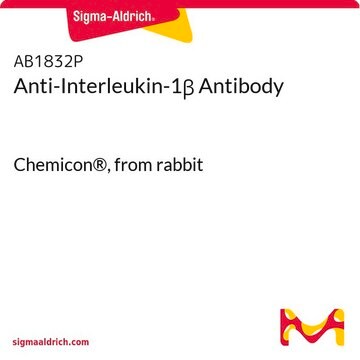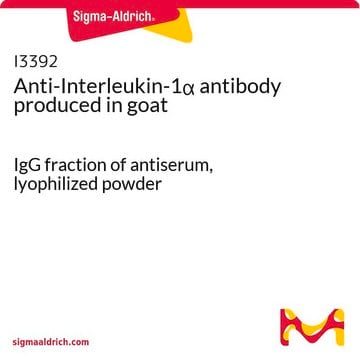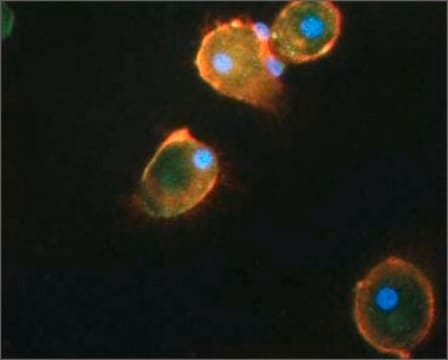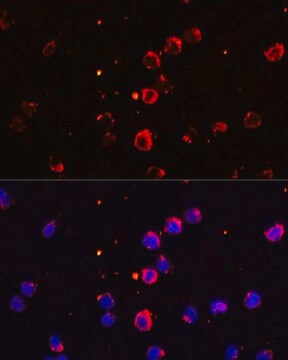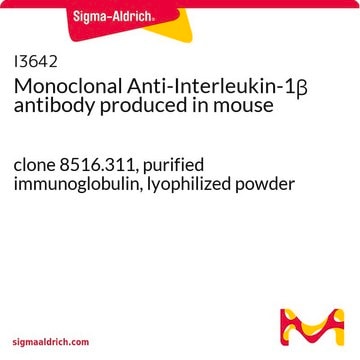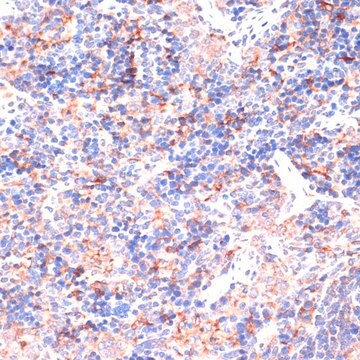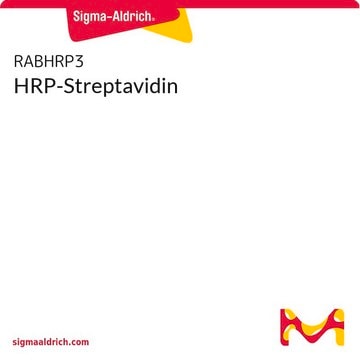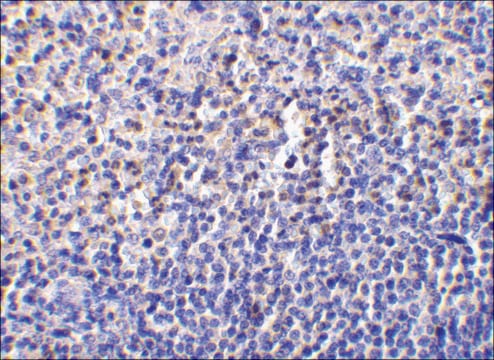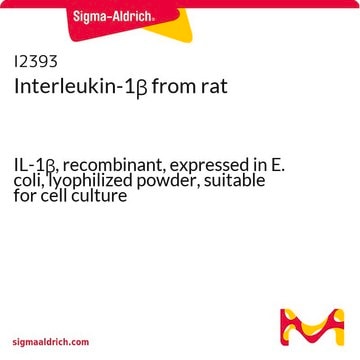I3767
Anti-Interleukin-1β antibody produced in goat
IgG fraction of antiserum
Synonym(s):
Anti-IL-1β
Sign Into View Organizational & Contract Pricing
All Photos(1)
About This Item
Recommended Products
biological source
goat
Quality Level
conjugate
unconjugated
antibody form
IgG fraction of antiserum
antibody product type
primary antibodies
clone
polyclonal
species reactivity
mouse
technique(s)
neutralization: suitable
western blot: suitable
UniProt accession no.
storage temp.
−20°C
target post-translational modification
unmodified
Gene Information
mouse ... Il1b(16176)
General description
Interleukins are proinflammatory cytokines produced on cell injury or trauma. There are two closely related types of interleukins produced by the cell, IL-1α and IL-1β that are produced by the activation of NF-κ B transcription factor in response to bacterial infection or LPS. Both IL-1α and IL-1β exert their cellular effects by signalling through IL-1 receptor type 1. IL-1β has pleiotrophic activities and is protective against infections by recruitment of neutrophils to the infection site, secretion of cytokines and chemokines and activation of adhesion molecules. IL-1β overproduction has been implicated in many auto-immune and allergic disorders such as Cryopirin-associated periodic syndromes, Muckle-Wells syndrome and skin lesions
Anti-Interleukin-1β antibody specifically reacts with mouse IL-1β. The antibody shows 25% cross reactivity with human recombinant IL-1β.
Anti-Interleukin-1β antibody specifically reacts with mouse IL-1β. The antibody shows 25% cross reactivity with human recombinant IL-1β.
Specificity
The antibody will neutralize the biological activity of recombinant mouse IL-1β, but not recombinant human IL-1β. The antibody shows ~25% cross-reactivity with recombinant human IL-1β.
Immunogen
recombinant mouse IL-1β.
Application
Anti-interleukin-1β may be used to neutralize the biological activity of recombinant mouse IL-1β on mouse T-helper D10.G4.1 cell line at a concentration of 50 picog/ml. No neutralization of the biological activity of recombinant human IL-1β is observed. The antibody may be used for immunoblotting at a working concentration 1-2 μg/ml or a dilution of 1:1000. In immunoblotting applications the antibody shows 25% cross-reactivity with human recombinant IL-1β.
Physical form
Lyophilized from a 0.2 μm filtered solution in phosphate buffered saline containing carbohydrates.
Preparation Note
Purified using protein G.
Disclaimer
Unless otherwise stated in our catalog or other company documentation accompanying the product(s), our products are intended for research use only and are not to be used for any other purpose, which includes but is not limited to, unauthorized commercial uses, in vitro diagnostic uses, ex vivo or in vivo therapeutic uses or any type of consumption or application to humans or animals.
Not finding the right product?
Try our Product Selector Tool.
Storage Class Code
11 - Combustible Solids
WGK
WGK 1
Flash Point(F)
Not applicable
Flash Point(C)
Not applicable
Personal Protective Equipment
dust mask type N95 (US), Eyeshields, Gloves
Certificates of Analysis (COA)
Search for Certificates of Analysis (COA) by entering the products Lot/Batch Number. Lot and Batch Numbers can be found on a product’s label following the words ‘Lot’ or ‘Batch’.
Already Own This Product?
Find documentation for the products that you have recently purchased in the Document Library.
Customers Also Viewed
Bruno Jennings-Almeida et al.
Journal of immunology (Baltimore, Md. : 1950), 206(10), 2441-2452 (2021-05-05)
Intestinal barrier is essential for dietary products and microbiota compartmentalization and therefore gut homeostasis. When this barrier is broken, cecal content overflows into the peritoneal cavity, leading to local and systemic robust inflammatory response, characterizing peritonitis and sepsis. It has
Luiza A de Castro-Jorge et al.
PLoS pathogens, 15(9), e1007934-e1007934 (2019-09-04)
Mayaro virus (MAYV) is an arbovirus that circulates in Latin America and is emerging as a potential threat to public health. Infected individuals develop Mayaro fever, a severe inflammatory disease characterized by high fever, rash, arthralgia, myalgia and headache. The
Fengyang Geng et al.
Neuroimmunomodulation, 23(2), 122-129 (2016-05-25)
Neuroinflammation plays an important role in secondary tissue damage after traumatic brain injury (TBI). Recently, the inflammasome-mediated inflammatory pathway has been observed in the inflammatory response of TBI. In this study, we investigated the influence of hyperbaric oxygen therapy (HBOT)
Chandradeo Narayan et al.
Journal of carcinogenesis, 11, 9-9 (2012-08-25)
Lung cancer is a leading cause of cancer death. There has been found a substantial gap in the understanding of lung cancer genesis at the molecular level. We developed urethane (ethyl carbamate) induced lung tumor mice model to understand the
Ju Chen et al.
Cancer gene therapy, 31(7), 1007-1017 (2024-06-20)
Activation of Gasdermin D (GSDMD) results in its cleavage, oligomerization, and subsequent formation of plasma membrane pores, leading to a form of inflammatory cell death denoted as pyroptosis. The roles of GSDMD in inflammation and immune responses to infection are
Our team of scientists has experience in all areas of research including Life Science, Material Science, Chemical Synthesis, Chromatography, Analytical and many others.
Contact Technical Service
